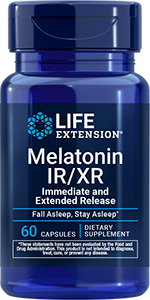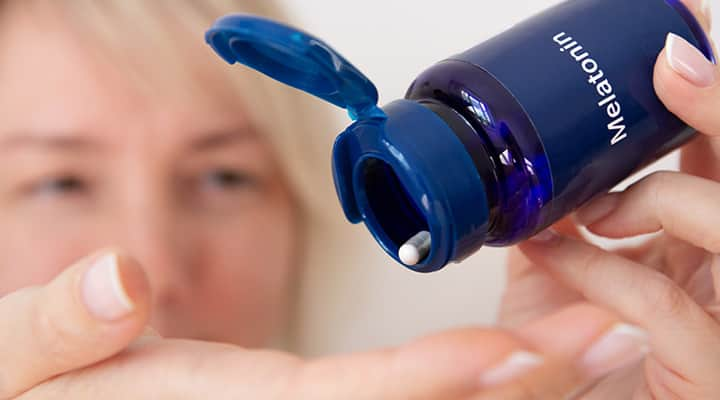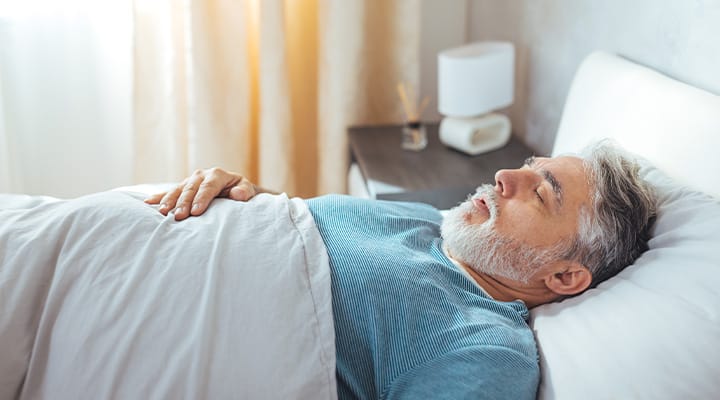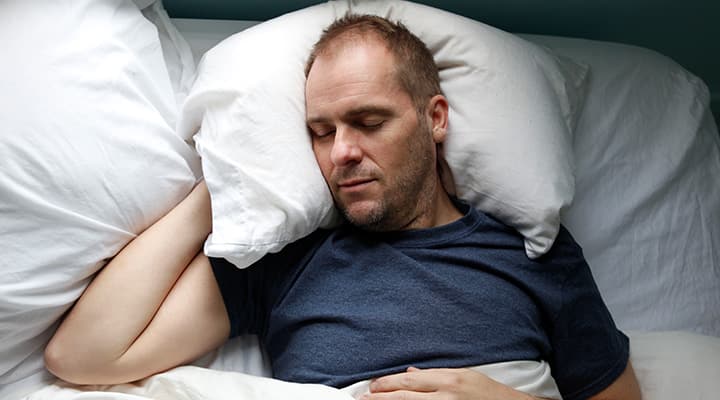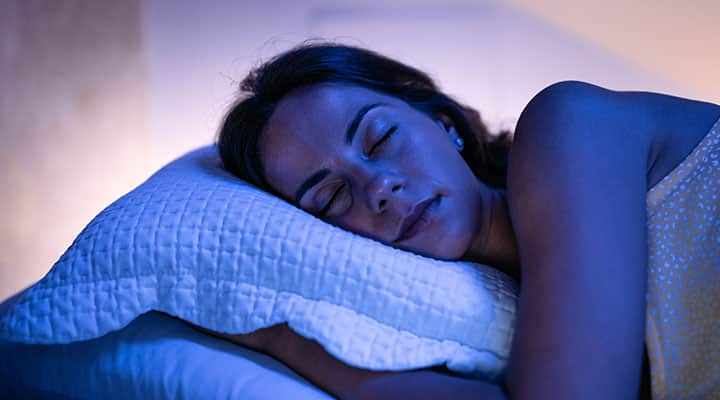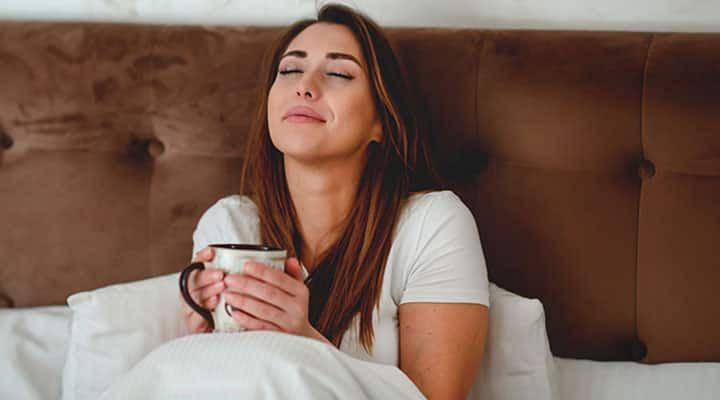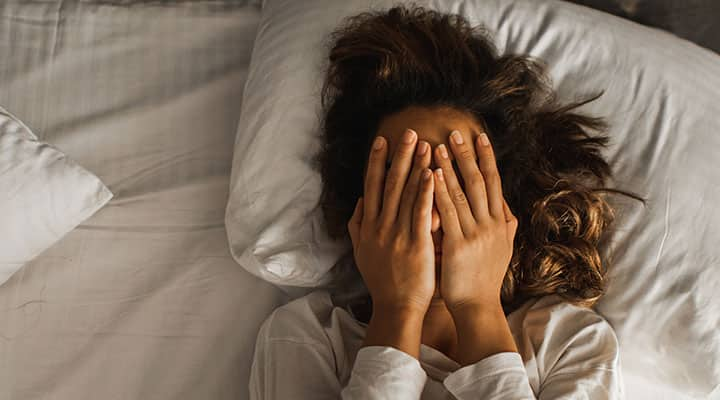
Valerian Root vs. Melatonin: Which One Is Better?
Published: April 2021 | Updated: October 2025
At a Glance
- Adding valerian root or melatonin, or both, to your bedtime routine may help support restful sleep.
- Melatonin is a hormone naturally produced in the body that supports healthy sleep-wake cycles.
- Valerian root is an herb that has a calming effect on the brain.
Getting seven to nine hours of deep sleep, then waking up feeling refreshed, renewed, and ready for the day ahead is an absolute dream. But this accomplishment is not always easy to repeat. Valerian root and melatonin are two quality sleep supplements that help you do just that—but which one is better?
The choice is more about personal preference and sleep support goals than which is better, said Shayna Sandhaus, PhD, a Senior Scientist at Life Extension. Even so, she noted, many people turn to melatonin first: "It's easily the most well-supported sleep supplement, with numerous clinical studies showing its efficacy. But some people want a sleep supplement without melatonin, and they turn to herbal sleep supplements with calming botanicals, like valerian root."
While unique in their makeup and effectiveness, melatonin and valerian root sleep supplements both support that calm wind-down before bed. Let's explore valerian root and melatonin to understand their differences so you can choose the supplement that will level up your sleep cycle in a way that's right for you.
What is valerian root?
Valerian root comes from the flowering Valerian plant, an herb native to Europe and Asia that has been used for its calming and sleep-promoting effects for thousands of years. Some research suggests that valerian root promotes calming by increasing the availability of gamma-aminobutyric acid (GABA), an amino acid that acts as an inhibitory ("slow down") neurotransmitter in the brain.
"Some compounds in valerian, like valerenic acid, may inhibit the breakdown of GABA or bind to GABA receptors, enhancing calming (inhibitory) signaling," said Dr. Sandhaus.
While more research is needed to support the effectiveness of valerian root, this sleep-friendly herb remains a popular choice, especially if you're looking for a melatonin-free, plant-based way to boost your bedtime ritual. Of course, you'll want to consult with your physician before you add any supplement to your routine.
Pro tip: If you are seeking the kind of calm that leads to peaceful dreams, you can also try a GABA supplement to help your body relax and encourage restful slumber.
What is melatonin?
Melatonin is a hormone that your body—the pineal gland in your brain, to be exact—makes in response to darkness. "In the brain, melatonin is crucial for keeping your internal clock ticking and maintaining your body's regular sleep-wake cycle," said Dr. Sandhaus. It has other roles as well. "In the body, melatonin is involved in supporting immune function and other aspects of health," she added.
Your circadian rhythm helps your brain keep track of the time of day, prompting your body to wind down and get ready for sleep once it's dark outside. However, in our modern world, our internal circadian clock is constantly disturbed by artificial lights, like the blue light from computers, phones and other screens. "This can slow your brain's natural melatonin production at bedtime, disrupting your ability to go to sleep easily," Dr. Sandhaus explained.
Most people think of melatonin supplements first when they're searching for sleep support. That's because "the sleep hormone" has many clinical studies touting its efficacy, impact on sleep latency (the time it takes a person to fall asleep), and sleep quality. This research supports melatonin supplementation for times when your sleep patterns are disrupted by occasional sleep disturbances, such as jet lag or staying awake all night with a fussy toddler.
Valerian root vs. melatonin: Key differences
These popular sleep supplements have different mechanisms of action, which means you should consider your needs when making a choice.
| Feature | Valerian Root | Melatonin |
|---|---|---|
| Type | Herbal supplement (plant extract) | Hormone (naturally produced in pineal gland) |
| Primary Action | Calming; enhances GABA signaling to promote relaxation | Helps regulate circadian rhythm and sleep–wake cycle |
| Best For | Restlessness, occasional stress | Difficulty falling asleep, jet lag, circadian disruption |
| Onset of Effects | Gradual; may take days to weeks of consistent use | Quick; usually within 30 to 60 minutes of dosing |
| Scientific Evidence of Efficacy | Weak to moderately documented | Strongly documented |
Explore Our Best Melatonin Supplements
Should you choose valerian root or melatonin?
Now that you understand the key differences, here's a quick melatonin vs. herbal supplements breakdown to help you make your choice.
Choose melatonin
: If your occasional sleeplessness is related to timing, and you want to support your sleep-wake cycle, or want something that will work within the hour.Choose valerian root
: If you're looking for a melatonin-free sleep support supplement, and you're experiencing stress or tension that's impacting the amount and quality of your sleep. You can also try other calming botanicals, such as chamomile, lemon balm or ashwagandha.Choose both
: If you feel occasional stress is affecting your sleep-wake patterns, you can opt to combine melatonin with an herbal sleep supplement, like valerian root, chamomile, lemon balm or ashwagandha.
No matter which supplement you choose, always follow the instructions on the label for correct valerian dosage vs. melatonin dosage.
Should you take valerian root and melatonin together?
You can take melatonin together with herbal support like valerian root, ashwagandha and lemon balm to support your sleep hygiene. "In general, supporting sleep health requires a multifaceted approach," said Dr. Sandhaus. "It's important to manage stress and ensure your sleeping environment is conducive to sleep."
Want to get on the path to more consistent restful sleep? A combination approach may help:
- Effective sleep supplements
- Eating a healthy diet
- Daily exercise
- A regular sleep schedule (going to bed and waking up at the same time)
For sleep quality, limit your time on screens before bedtime and make the bedroom your slumber oasis—we're talking blackout curtains, cooler temps (ideally, 60-68 degrees) and a sleep mask.
Reminder: Any time you're thinking about adding new supplements to your roster, a chat with your health care provider is a great first step.
A number of nutrients help promote restful sleep. Take our health needs quiz to get supplement advice tailored to your health goals.
FAQs
Is melatonin or valerian root better for falling asleep quickly?
If you want to promote falling asleep faster, melatonin is better. It normally takes 30 to 60 minutes for melatonin to work in your body.
How long does valerian root take compared to melatonin?
Valerian root works more slowly in the body, Dr. Sandhaus said, needing days or weeks of consistent use to have a noticeable effect. Melatonin works more quickly, often within 30 to 60 minutes after taking it. "It's crucial to remember that everyone has a unique biology, so results may vary from person to person," Dr. Sandhaus added.
Both supplements (individually or together) should be taken 30 to 60 minutes before bedtime.
Is valerian root or melatonin okay for long-term use?
Yes, based on studies, both valerian root and melatonin supplements are considered okay and well-tolerated, if taken according to the supplement label. The longest valerian studies are generally a few months, but melatonin has been used safely in some studies for several years. However, "if someone is experiencing long-term sleep challenges, they should strongly consider going to a sleep specialist to evaluate the source," Dr. Sandhaus noted.
Key Takeaways
- Getting a good night's sleep is a key component of mental and physical health; valerian root and melatonin can support your sleep routine.
- Your choice depends on your preference and sleep-support goals. If occasional sleeplessness is related to timing, choose melatonin; if it's related to occasional stress, valerian root may help.
- It's okay to take melatonin and valerian root together to support healthy sleep.
References
- Auld F, et al. "Evidence for the efficacy of melatonin in the treatment of primary adult sleep disorders." Sleep Med Rev. August 2017. https://pubmed.ncbi.nlm.nih.gov/28648359/
- Chan V, Lo K. "Efficacy of dietary supplements on improving sleep quality: a systematic review and meta-analysis." Postgrad Med J. April 2022. https://pubmed.ncbi.nlm.nih.gov/33441476/
- Chandra Shekhar H, et al. "Standardized Extract of Valeriana officinalis Improves Overall Sleep Quality in Human Subjects with Sleep Complaints: A Randomized, Double-Blind, Placebo-Controlled, Clinical Study." Adv Ther. January 2024. https://pubmed.ncbi.nlm.nih.gov/37899385/
- Cruz-Sanabria F, et al. "Optimizing the Time and Dose of Melatonin as a Sleep-Promoting Drug: A Systematic Review of Randomized Controlled Trials and Dose-Response Meta-Analysis." J Pineal Res. August 2024. https://pubmed.ncbi.nlm.nih.gov/38888087/
- Fatemeh G, et al. "Effect of melatonin supplementation on sleep quality: a systematic review and meta-analysis of randomized controlled trials." J Neurol. January 2022. https://pubmed.ncbi.nlm.nih.gov/33417003/
- Ferracioli-Oda E, et al. "Meta-analysis: melatonin for the treatment of primary sleep disorders." PLoS One. May 2013. https://pubmed.ncbi.nlm.nih.gov/23691095/
- Ghasemzadeh Rahbardar M, Hosseinzadeh H. "Therapeutic potential of hypnotic herbal medicines: A comprehensive review." Phytother Res. June 2024. https://pubmed.ncbi.nlm.nih.gov/38595123/
- Li T, et al. "Exogenous melatonin as a treatment for secondary sleep disorders: A systematic review and meta-analysis." Front Neuroendocrinol. January 2019. https://pubmed.ncbi.nlm.nih.gov/29908879/
- Morin CM, Buysse DJ. "Management of Insomnia." The New England Journal of Medicine. July 2024. https://www.nejm.org/doi/full/10.1056/NEJMcp2305655?utm_source=openevidence
- Sahin K, et al. "Impact of a Novel Valerian Extract on Sleep Quality, Relaxation, and GABA/Serotonin Receptor Activity in a Murine Model." Antioxidants. May 2024. https://www.mdpi.com/2076-3921/13/6/657
- Salame A, et al. "Over-the-counter products for insomnia in adults: A scoping review of randomised controlled trials." Sleep Med. May 2025. https://pubmed.ncbi.nlm.nih.gov/40054227/
- Sateia MJ, et al. "Clinical Practice Guideline for the Pharmacologic Treatment of Chronic Insomnia in Adults: An American Academy of Sleep Medicine Clinical Practice Guideline." J Clin Sleep Med. February 2017. https://pmc.ncbi.nlm.nih.gov/articles/PMC5263087/
- "Melatonin: What You Need To Know." National Center for Complementary and Integrative Health. May 2024. https://www.nccih.nih.gov/health/melatonin-what-you-need-to-know
- "Valerian." National Center for Complementary and Integrative Health. May 2025. https://www.nccih.nih.gov/health/valerian
Always be in the know!
Access the latest deals, wellness news, expert health tips & more!

